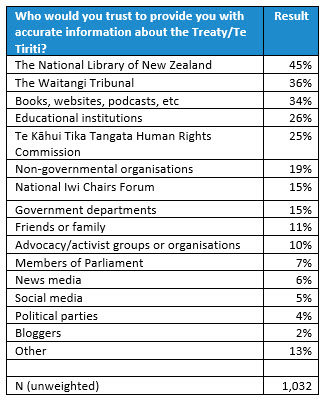Home : Research Results : 70%: decide on an equal footing how Te Tiriti is honoured
Research Results
70%: decide on an equal footing how Te Tiriti is honoured
22 Nov 23

70% of New Zealanders believe it is important for Māori and non-Māori to decide together on an equal footing how te Tiriti o Waitangi is honoured.
This is one of the crucial findings for Aotearoa of a Horizon Research survey conducted for Te Kāhui Tika Tangata Human Rights Commission earlier this month.
Respectful discusssion
It also found 80% of adult New Zealanders think respectful discussion of racial issues is important.
“Te Tiriti is our founding human rights document in Aotearoa New Zealand, and as this survey highlights, most people want us to build on it as a source of strength for our country,” says the Commission’s Rongomau Taketake (Indigenous Rights partner) Claire Charters.
Listening, understanding
64% of those surveyed agreed that working together requires more careful listening and understanding and less political rhetoric.
“Te Tiriti o Waitangi is well recognised as a partnership between Māori and non-Māori, and both parties should be making decisions about the future together, on an equal playing field,” says Charters.
“In that sense, it’s not the government alone nor Māori alone who have the final say, but it’s both working together,” says Charters.
Chief Human Rights Commissioner Paul Hunt says “while the government of the day could propose something like a referendum on how te Tiriti is applied, such a move needs to be with the agreement of its treaty partner, Māori.”
More than 500 Māori signed te Tiriti o Waitangi in 1840, representing many iwi and hapū in Aotearoa.
“People generally want decisions around te Tiriti to proceed with care, and that can happen when government treats its treaty partner as an equal,” says Hunt “and people need to understand that te Tiriti benefits everyone in Aotearoa.”
More education needed
Education is pivotal if the rights within te Tiriti o Waitangi are to be realised for everyone in Aotearoa New Zealand, says Charters.
One of the Commission’s functions under the Human Rights Act is to promote a better understanding of the human rights dimensions of the Treaty of Waitangi and their relationship with domestic and international human rights law. The Commission itself is on a journey to becoming an organisation that reflects te Tiriti o Waitangi in its work, culture, staff capability, and structures.
Important of knowing history: 83% say it is important
The Horizon survey finds 83% of adult New Zealanders believe that a country where everyone knows its history is important.
Informed about Te Tiriti/ The Treaty
Only 58% believe they are informed about te Tiriti o Waitangi and 32% say they are uninformed.
Only 13% have read te Tiriti o Waitangi (te reo Māori version), and 23% have read the English translation of the Māori text.
Overall, 32% haven’t read any version or summary of the Treaty/ Te Tiriti.
Ti Tiriti/ Treaty applies to everyone?
Charters says that as expected, the survey showed divergent views among New Zealanders. For example, there were lower levels of agreement that Te Tiriti applies to everyone in Aotearoa New Zealand, not just Māori (58% agreed).
Furthermore, only 49% agreed that Te Tiriti relates to human rights, which represents an opportunity for education amongst New Zealanders.
“There is more work to be done to build a shared understanding of te Tiriti o Waitangi and our roles and responsibilities,” says Charters.
Poll results are available here.
Some key results
What is important for the country?
Overall, when thinking about what is important for the country, people believe that discussion needs to be respectful, harmonious and decided on an equal footing.
80% (3,231,000 adults believe that “Respectful discussion of Te Tiriti o Waitangi/the Treaty of Waitangi and racial issues” is important.
- 51% (2,051,000 adults) believe it is very important.
70% (2,817,000 adults) believe it is important for Māori and non-Māori to decide together on an equal footing how The Treaty/ Te Tiriti is honoured.
- 41% (1,650,000 adults) believe it is very important.
83% believe that a country where everyone know its history is important.
- 58% (2,367,000) believe it is very important.

Trust sources of information
 The five most trusted sources to provide accurate information about the Treaty/Te Tiriti are:
The five most trusted sources to provide accurate information about the Treaty/Te Tiriti are:
- The National Library of New Zealand – 45%
- The Waitangi Tribunal – 36%
- Books, websites, podcasts, etc that cover New Zealand history – 34%
- Educational institutions (e.g. schools/universities) – 26%
- Te Kāhui Tika Tangata Human Rights Commission – 25%.
The five least trusted sources are:
- Bloggers – 2%
- Political parties – 4%
- Social media - 5%
- News media – 6%.
Radio New Zealand reports the survey here.
Methodology
HorizonPoll Online Survey system
and website developed by BEWEB
Copyright © 2010. HorizonPoll incorporating ShapeNZ - Listening to New Zealand


